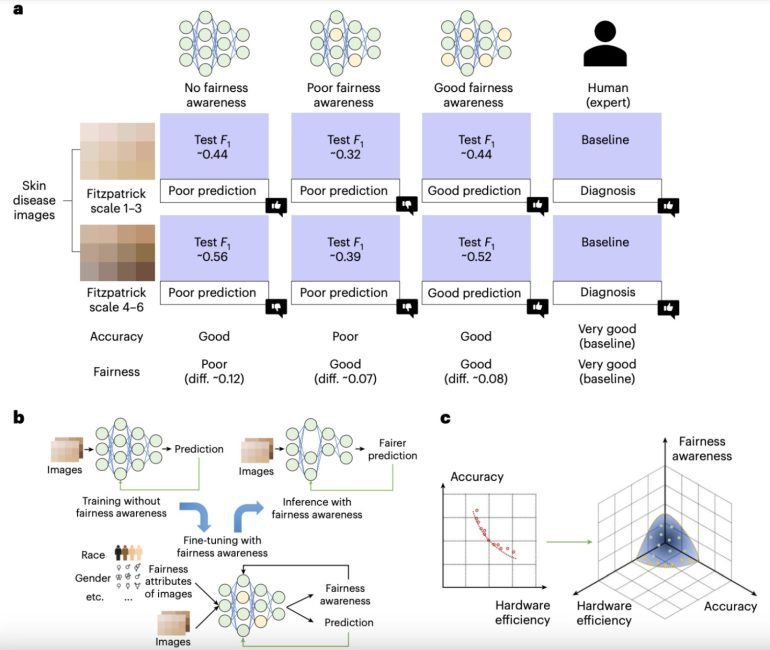- Deep neural networks (DNNs) show performance disparities influenced by training data and hardware.
- Fairness issues in AI, such as biases in facial recognition, are partly due to imbalanced data.
- University of Notre Dame researchers studied how hardware systems affect AI fairness, specifically computing-in-memory (CiM) designs.
- Larger, more complex models are generally fairer but more complicated to deploy on resource-constrained devices.
- Hardware-induced non-idealities like device variability can create trade-offs between accuracy and fairness.
- Strategies like model compression and noise-aware training can enhance fairness without significantly increasing computational demands.
- The importance of considering hardware in AI development is emphasized, especially for sensitive applications like medical diagnostics.
Main AI News:
Over the past few decades, deep neural networks (DNNs) have made significant strides in solving real-world problems. However, issues of fairness have emerged, with performance discrepancies often tied to the data used for training and the hardware platforms on which these models operate. For instance, facial recognition systems have demonstrated better accuracy with fair-skinned individuals than dark-skinned ones, highlighting inherent biases due to imbalanced training data.
Researchers at the University of Notre Dame have expanded their focus on AI fairness by examining the impact of hardware systems. Their study, published in Nature Electronics, delves into how emerging computing-in-memory (CiM) hardware designs can influence the fairness of DNNs. While much of the previous research has centered on algorithmic fairness, this study highlights the often-overlooked role of hardware.
The study’s experiments explored how variations in hardware-aware neural architecture designs, particularly in size and complexity, affect AI fairness. Larger, more complex models were found to be fairer and more challenging to deploy on resource-constrained devices. To address this, the researchers proposed strategies such as compressing larger models to retain performance while reducing computational demands.
Further experiments investigated the impact of hardware-induced non-idealities, such as device variability, on AI fairness. The findings revealed trade-offs between accuracy and fairness depending on the hardware setup, with existing methods to improve robustness contributing to these trade-offs. To mitigate these effects, noise-aware training strategies were suggested to enhance robustness and fairness without increasing computational requirements.
This research underscores the importance of considering hardware in the development of AI, particularly for sensitive applications like medical diagnostics. The Notre Dame team’s work aims to ensure that AI systems are both accurate and equitable, capable of consistent performance across diverse user groups.
The researchers plan to investigate the intersection of hardware design and AI fairness. Their future efforts will focus on developing cross-layer co-design frameworks that optimize neural networks for fairness within hardware constraints and exploring new hardware platforms that inherently support fairness and efficiency. These initiatives are crucial as AI continues to permeate society, where fair and unbiased decision-making is increasingly essential.
Conclusion:
The intersection of hardware design and AI fairness is becoming increasingly significant for the market. As AI systems are integrated into more applications, particularly in high-stakes industries like healthcare, the demand for fairness and efficiency in AI models will drive innovation in hardware development. Companies that can offer hardware solutions optimized for AI fairness will gain a competitive advantage, particularly as regulators and consumers push for more equitable AI systems. This emerging focus on hardware considerations opens new opportunities for differentiation in the AI hardware market, potentially leading to the development of specialized devices designed to support fair and unbiased AI operations.

